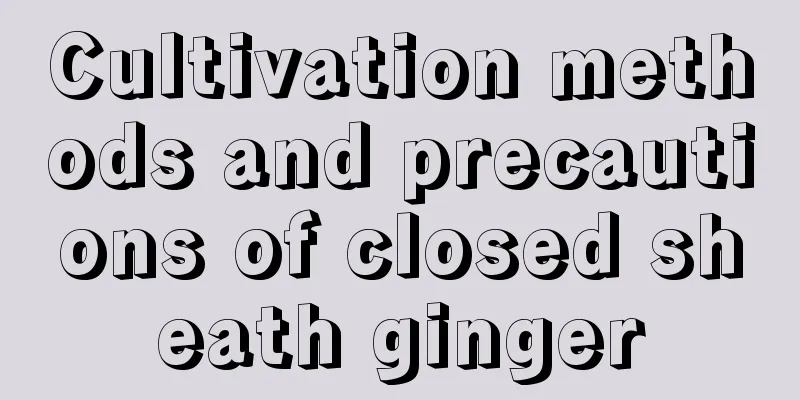Cultivation methods and precautions of closed sheath ginger

How to cultivate closed sheath gingersoilGinger has strong adaptability to soil and can grow in various soils, but it prefers loose, fertile, well-drained sandy soil, so it is better to choose such soil when planting. Before planting, you can disinfect the soil and apply a little base fertilizer. Light and temperatureGinger likes warmth and plenty of light. It is not tolerant to strong light, but can tolerate shade. The growing environment of Ginger needs to avoid direct sunlight. You can choose to maintain it in a cool place with bright light or build a sunshade to provide shade when the light is strong in summer. The suitable temperature for the growth of Ginger is 20℃-30℃. It can grow under higher temperatures and will be in a semi-dormant state in winter. Ginger has a strong cold resistance and can withstand temperatures above 0℃. Be careful not to let it freeze, otherwise the above-ground part of the plant will wither and die. It can withstand high temperatures above 35°C in summer and continue to grow, but the growth rate is slower. Water and fertilizer managementGinger likes a humid environment, requires moist soil and high air humidity, and needs a lot of fertilizer during the growing period. When cultivating Ginger, it is necessary to fertilize frequently. Wood ash, potassium sulfate, etc. can be used. You can also apply decomposed cake fertilizer water and farmyard manure, which is beneficial to the growth of the plant. Things to note when growing closed gingerReproductionThe propagation of Ginger is generally by sowing, cuttings, or root division. Pest controlGinger has strong disease resistance and rarely suffers from diseases and insect pests, but it may be susceptible to diseases such as leaf spot, as well as damage from pests such as borers, scale insects, and caterpillars. When ginger is threatened by diseases and pests, timely measures should be taken to prevent and control it, and more fertilizer should be applied to improve its disease resistance. |
<<: Cultivation methods and precautions of red Ruimu
>>: Cultivation methods and precautions of red banana
Recommend
Flower Story
Platycodon grandiflorum Sincere and unchanging lo...
When to prune camellia, when and how to prune camellia
1. Pruning time The time for pruning camellia is ...
Plants suitable for water cultivation at home, these are beautiful and easy to grow
1. Pothos It can be considered a very common plan...
What is the best month to plant turmeric?
When to plant turmeric Turmeric is usually more s...
How to plant Bletilla striata and how much does it cost per pound
1. Cultivation Methods 1. Seed planting: You need...
Ten auspicious trees in the courtyard
1. Ginkgo Tree Ginkgo trees grow slowly and have ...
Is Tillandsia poisonous?
1. Is it toxic? Tillandsia is a non-toxic plant. ...
Can pregnant women at home raise evergreens?
Is it poisonous? Dieffenbachia is a poisonous pla...
Can succulents be sprayed with nutrient solution?
1. Usage Plant nutrient solution is like fertiliz...
Peach blossom growth environment conditions and characteristics
Peach blossom growth environment conditions and r...
What to do if the Green Bell doesn't bloom
Cause Analysis Seasonal differences: Although the...
The efficacy and effects of saffron
1. Regulate endocrine It can promote the blood ox...
Does Oxalis prefer shade or sun?
Oxalis is a plant with unique and brightly colore...
The difference between Chinese rose and rose
1. Difference of spikes Rose is also called Catha...
The efficacy and role of biting cats
Dietary value The tender stems and leaves of the ...









